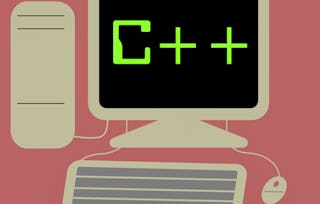This course is for experienced C programmers who want to program in C++. The examples and exercises require a basic understanding of algorithms and object-oriented software.

C++ For C Programmers, Part B

C++ For C Programmers, Part B
This course is part of multiple programs.

Instructor: Ira Pohl
61,463 already enrolled
Included with
334 reviews
What you'll learn
Use the Standard Template Library.
Apply inheritance logic and C++ syntax.
Describe and compare Min-Max and the Alpha-Beta algorithm for game playing.
Skills you'll gain
- Debugging
- Algorithms
- Game Design
- Software Design Patterns
- C++ (Programming Language)
- Graph Theory
- Data Structures
- Artificial Intelligence
- C (Programming Language)
- Object Oriented Programming (OOP)
- Skills section collapsed. Showing 9 of 10 skills.
Details to know

Add to your LinkedIn profile
See how employees at top companies are mastering in-demand skills

Build your subject-matter expertise
- Learn new concepts from industry experts
- Gain a foundational understanding of a subject or tool
- Develop job-relevant skills with hands-on projects
- Earn a shareable career certificate

There are 5 modules in this course
This module looks at the architecture of the Standard Template Library. It is especially important to understand how iterators are used to access container to produce highly efficient generic algorithms. The module also includes the important new style of function object—the lambda expression.
What's included
16 videos1 reading
This module shows how Hex can be played as a game on a graph. This involves its representation as an undirected graph in C++. The module explores the inheritance logic and syntax of C++. A principal example is the base class student and a derived class grad_student.
What's included
14 videos1 reading1 peer review
This module explains Min-Max and the Alpha-Beta algorithm for game playing. Its programming topics include C++ 11 Move semantics and a detailed example of referential garbage collection.
What's included
11 videos1 reading
This module shows how to use Monte Carlo evaluation in complex games such as Hex and Go. This had led top championship level play in both these games. The module discusses C++ assertions and exceptions for error handling and the new C++ 11 feature static asserts. Finally, the last part of the module introduces the idea of “Design Pattern”, a feature of modern OO programming.
What's included
16 videos1 reading1 peer review
This module contains three practice exams (which you can take as many times as you'd like) and the final exam, which is worth X% of your grade in this course.
What's included
4 assignments
Earn a career certificate
Add this credential to your LinkedIn profile, resume, or CV. Share it on social media and in your performance review.
Instructor

Offered by
Explore more from Software Development
 Status: Free Trial
Status: Free TrialUniversity of California, Santa Cruz
 Status: Preview
Status: PreviewSimplilearn
 Status: Free Trial
Status: Free Trial Status: Free Trial
Status: Free TrialMicrosoft
Why people choose Coursera for their career

Felipe M.

Jennifer J.

Larry W.

Chaitanya A.
Learner reviews
- 5 stars
70.05%
- 4 stars
17.96%
- 3 stars
5.68%
- 2 stars
1.79%
- 1 star
4.49%
Showing 3 of 334
Reviewed on Sep 1, 2024
Its good course but there is 1 problem. There are too many plagiators just cheating through this course. I got probably 1 proper assignment out of 5. Rest was copy-paste from internet.
Reviewed on Jul 26, 2023
So help full for our generation . And also the teaching was excellent . Thank you......
Reviewed on Aug 23, 2020
From History to Today's Programming World, every session lookout from Great perspective & passes through students that's really appreciate.

Open new doors with Coursera Plus
Unlimited access to 10,000+ world-class courses, hands-on projects, and job-ready certificate programs - all included in your subscription
Advance your career with an online degree
Earn a degree from world-class universities - 100% online
Join over 3,400 global companies that choose Coursera for Business
Upskill your employees to excel in the digital economy
Frequently asked questions
To access the course materials, assignments and to earn a Certificate, you will need to purchase the Certificate experience when you enroll in a course. You can try a Free Trial instead, or apply for Financial Aid. The course may offer 'Full Course, No Certificate' instead. This option lets you see all course materials, submit required assessments, and get a final grade. This also means that you will not be able to purchase a Certificate experience.
When you enroll in the course, you get access to all of the courses in the Specialization, and you earn a certificate when you complete the work. Your electronic Certificate will be added to your Accomplishments page - from there, you can print your Certificate or add it to your LinkedIn profile.
Yes. In select learning programs, you can apply for financial aid or a scholarship if you can’t afford the enrollment fee. If fin aid or scholarship is available for your learning program selection, you’ll find a link to apply on the description page.
More questions
Financial aid available,
¹ Some assignments in this course are AI-graded. For these assignments, your data will be used in accordance with Coursera's Privacy Notice.

